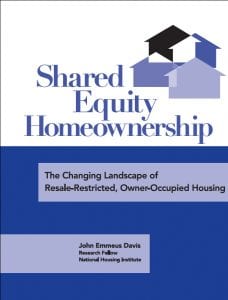
The unanswered questions identified during the first phase of the research have helped to shape the agenda for the second phase. The research will be conducted by a team to be assembled by NHI and led by NHI’s recently appointed research director, Carla J. Robinson. This phase of the project will lead to a better understanding of the prevalence, dynamics, and effectiveness of shared-equity homeownership.
With financial support from the Lincoln Institute of Land Policy, NHI has launched the second phase of this research with a study of the taxation of shared-equity homes. The owners of these homes, like the owners of market-rate homes, pay property taxes to the municipalities in which they reside. Although these owners are willing to pay their fair share of local property taxes, they are too often required to pay much more. Many municipal assessors, in assigning values and levying taxes, take little or no account of the fact that shared-equity housing is heavily encumbered with durable restrictions on occupancy, use, subletting, and resale-restrictions that significantly constrain a property’s marketability and profitability. Consequently, the owners of shared-equity homes frequently pay taxes not only on value that is theirs, but on value they can never claim for themselves. At a certain point, no matter how affordable the cost of purchasing these homes may be, taxes that are pegged to a property’s market value will render the homes unaffordable for persons of modest means.
A more equitable approach to taxing resale-restricted property is necessary if the affordability of shared-equity housing is to be protected, rather than eroded. Fortunately, policies and procedures for the more equitable taxation of community land trusts, limited-equity cooperatives, and other forms of resale-restricted, owner-occupied housing do exist in some states. Such policies and procedures compel local assessors to take account of the durable restrictions that encumber shared-equity homes.
The more equitable taxation of resale-restricted, owner-occupied homes has sometimes resulted from judicial action by a state’s highest court. For example, in 1989, the Appellate Division of the New Jersey Superior Court in Prowitz v. Ridgefield Park Village endorsed the lower taxation of residential real estate encumbered with an affordability covenant, pointing out that resale restrictions impose a “patent burden on the value of the property.”
Sometimes legislative action has been necessary, requiring local assessors to take account of resale controls. For example, the Vermont Law on Property Tax Appraisals of Covenant-Restricted Homes, enacted in 2005, says that procedures for estimating the fair-market value of a property must take into consideration any “decrease in value in non-rental residential property due to a housing subsidy covenant….” In other states, favorable taxation of shared-equity homes has resulted from administrative action by a state board. Since 1981, for example, the California State Board of Equalization has issued a series of letters to county assessors instructing them to enter resale-restricted homes onto local tax rolls at their actual sales prices and to use other resale-restricted property as comparables in adjusting the valuation of these homes over time.
Even in states where a court, legislature, or board of equalization has ordered resale-restricted housing to be taxed more equitably, however, it may be still left to local assessors to decide exactly how the encumbered value of a shared-equity home is to be calculated. In states where no statewide guidance exists for valuing and taxing resale-restricted housing, local assessors are almost completely free to acknowledge these restrictions – or not.
To date, little research has been done to document the various ways in which shared-equity housing is taxed in the United States or to analyze what the most equitable and sustainable method of taxation might be. NHI’s research on this topic is designed to close this gap. The research consists of two components. First, we will catalogue and classify the laws, policies, and procedures under which resale-restricted, owner-occupied housing is taxed in all 50 states. This will allow us to address the following questions:
What judicial, legislative, or administrative guidance is given to municipal tax assessors within each state with regard to the valuation and taxation of shared-equity homes?
How do the legal requirements, policy guidelines, and administrative procedures for the taxation of resale-restricted, owner-occupied housing differ from one state to another?
Given the discretion that municipal tax assessors are often granted, even in states where guidance is given by a state court, state legislation, or a state board of tax equalization, how are local assessors actually valuing resale-restricted, owner-occupied housing when this property is entered onto local tax rolls? How are local assessors adjusting the value of this property over time?
Second, we will analyze the pros and cons of various methods for valuing and taxing resale-restricted, owner-occupied housing, drawing on the state-by-state information gathered for the first component. We will be guided by a panel of experts assembled by NHI for this purpose. This analysis will focus on those states that have made special provision for valuing and taxing shared-equity homes. It will examine the legal application and economic effects of these policies on the continuing affordability of the portfolio managed by community land trusts, limited-equity cooperatives, and the sponsors of deed-restricted housing. It will also identify the long-term effects of the policies on municipal tax revenues and will establish criteria for recommending a set of best practices for taxing the property, balancing what is best for the owners of shared-equity homes with what is best for a municipality.
We expect the findings from our study to provide developers, managers, and supporters of resale-restricted, owner-occupied housing with information they can use to advocate for more equitable tax treatment of these properties. By valuing and taxing shared-equity homes in ways that reflect the durable restrictions placed on them, state and local authorities can help to ensure their continued affordability for years to come.



Comments